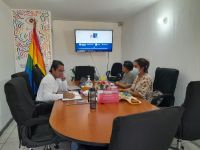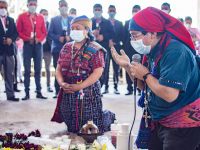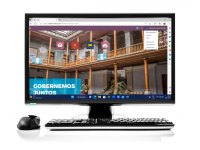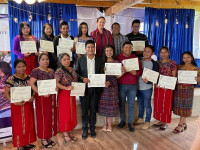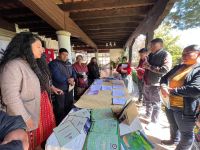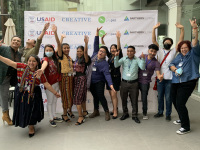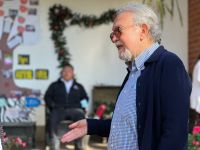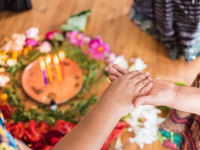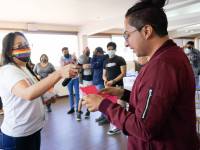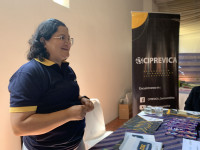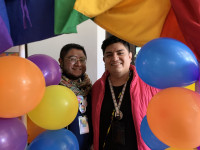Nothing about us, without us
By Erin Treinen
Quetzaltenango, Guatemala — There were smiles and excitement as 12 Guatemalan civil society organizations arrived at the event center and prepared to connect with their peers at the Peacebuilding Project Partners Retreat. Between project staff and 12 civil society organization representatives, 74 people traveled from five departments in the Western Highlands and Guatemala City to discuss how they can promote peace in their communities.
The retreat was designed to achieve teambuilding, learning, and strategic collaboration, contributing to a shared vision and increased coordination between the Peacebuilding Project—a goal that was met according to participants like Estuardo Aguilón Garcia, Peacebuilding Project Community Facilitator for Comitancillo.
“This experience allowed us to optimize our work in the field and respond to what the communities have asked the project for support with,” says Aguilón.
The Peacebuilding Project, which is known as Tejiendo Paz in Spanish and funded by the U.S. Agency for International Development, works to reduce social conflict and violence and strengthen social cohesion in the Western Highlands of Guatemala.
The project works with groups that are most impacted by conflict, yet are often left out of the peacebuilding process, including women, youth, indigenous peoples and LGBTQI+ individuals. Tejiendo Paz facilitates spaces for the substantive participation of all members of society in defining their own development priorities. This includes engaging with local civil society organizations that are led by members of these different groups.
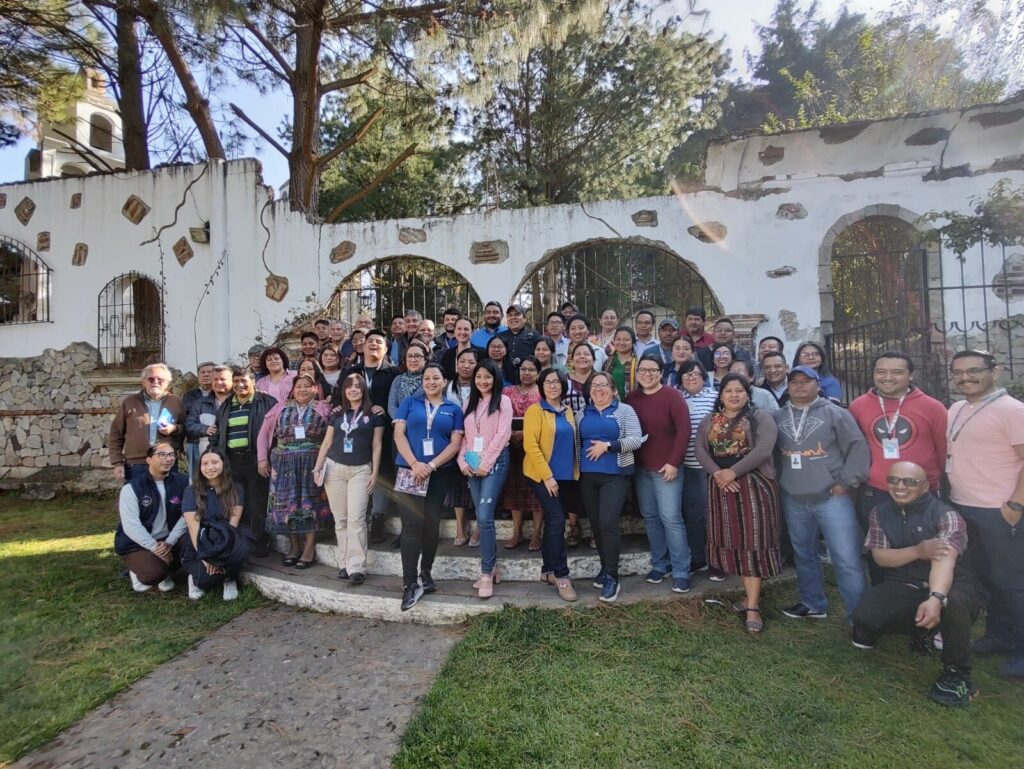
Learning, sharing, collaborating
The Peacebuilding Project is designed to be locally led and community driven. Project community facilitators, who are from the region where the project works, receive in-depth trainings on how to work with communities to develop and implement their own actions plans that address and transform sources of conflict into opportunities for development.
To effectively respond to community priorities, it is critical to engage local organizations that have a breadth of knowledge and experience working in the local context and who are trusted by local leaders.
Participants in Tejiendo Paz’s recent two-day retreat exchanged experiences and local knowledge around conflict mitigation, violence prevention and peacebuilding. They shared their plans and engaged in an in-depth discussion on the project’s strategy for identifying, addressing and mitigating electoral conflict, trainings on best-practices and roundtable discussions around collaboration.
“With this exchange, partner organizations shared information which will help us to better implement in the field through collaboration,” explains Mary de Leon, Peacebuilding Project Community Facilitator for Totonicapán.
Localization in action
The Peacebuilding Project operationalizes USAID’s localization strategy by employing an implementation staff that is from the area where they are implementing, partnering with local civil society organizations, and seeking council and guidance from advisory groups, including ancestral authorities.
The recent two-day exchange increased alliances and effective coordination between local project staff and partners. De Leon shared that, during these roundtable discussions, she connected with representatives from the Association of Guatemalan Exporters (AGEXPORT) who gave her guidelines and recommendations to effectively structure the women’s groups she works with so they can successfully carry out AGEXPORT projects.
De Leon was particularly interested in this opportunity as she works with many women’s groups including one from Pachoc, Totonicapán who recently learned how to embroider traditional blouse (known as huipiles) through a nine-session course. De Leon plans on facilitating a working relationship between this women’s group and AGEXPORT.
Likewise, civil society organizations were able to connect with one another to learn about the ways they are working to reduce conflict, utilizing different approaches and reaching distinct populations. During roundtable discussions, they also had the opportunity to visualize how their work overlaps and the ways they can collaborate to increase impact.
We Are Diverse Youth in Action (SOMOS), Vidas Paralelas and LAMBDA, three civil society organizations that work in LGBTQI+ human rights, all attended the event and were able to connect with one another to strengthen their working relationship and support one another.
“The activities were very insightful and helped us to build relationships with each other,” says Eduardo Aguilar, Community Promoter for SOMOS.
“During these two days, we created community together which strengthens us as a team and the activities we learned are ones that will make us more effective when we implement in the communities where we work,” he says.
Knowledge of local language, culture and dynamics make all the difference
Promoting the inclusion of local leadership and civil society organizations in decisions around how programs are implemented is key to sustainability, especially in a multicultural, multilingual country like Guatemala.
“Working with organizations that have credibility and local recognition, as well as the knowledge of unique local characteristics, culture and dynamics warrants more trust and acceptance from the communities as well as indigenous and state authorities,” says Luz Lainfiesta, Deputy Director of the Peacebuilding Project and development expert from Guatemala.
“This approach has a great impact because our implementation team ensures cultural relevance and carries out local practices. In addition, working to strengthen local organizations increases sustainability and project outcomes, far into the future,” says Lainfiesta.
This is not just Lainfiesta’s opinion.
An external evaluation conducted in 2022 found that the Peacebuilding Project’s community facilitators like De Leon and Aguilón can facilitate strong relationships within each community, because they are from the areas they serve, speak the regional language and are part of the local culture.
“Exchanges like this one provide important opportunities in which participants mutually share and learn and at the same time, create bridges of communication and collaboration,” says Lainfiesta. “They allow for a collective understanding between groups of people and strengthen the capacity of the individuals in those groups,” she says.
Partnering for peace
Tejiendo Paz is implemented by USAID and Creative Associates International, in consortium with PartnersGlobal and ProPaz, reaching 130 communities in 15 municipalities. In addition to ProPaz, the project currently has 11 other local civil society grantees; as well as four grantees who have completed their projects.
Click below for photo slideshow.
Local partners that have concluded their grants include:
Guatemala Association of Indigenous Mayors and Authorities (Asociación Guatemalteca de Alcaldes y Autoridades Indígenas, AGAAI), Center for Studies on Conflict, Power, and Violence (Centro de Estudios sobre Conflictividad, Poder y Violencia, CENDES), Foundation for Education and Social Development (Fundación de Educación y Desarrollo Social, FUDESA), Pies de Occidente


